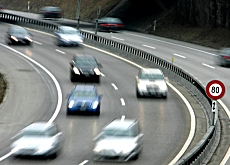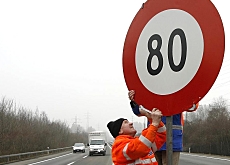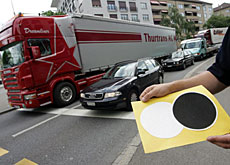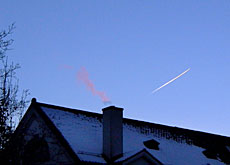Cantons say smog measures justified

The lower motorway speed limits introduced earlier this year in Switzerland's populous northern cantons to combat high air pollution levels were justified.
In all, the cantons which introduced the measure said smog levels dropped by up to ten per cent. But they say more has to be done.
In February about half the country’s cantons – mainly in the German-speaking part of the country – reduced speed limits along motorways in northern and central Switzerland from 120 kilometres per hour to 80kmh.
The five-day exercise was aimed at combating record levels of dust particle emissions across the country.
In a joint statement on Wednesday, the cantons concerned, including Zurich and Bern, said measurements taken during the period when the speed limits applied showed that smog was reduced on the affected roads by up to ten per cent compared with other places.
Furthermore, there were between ten and 14 per cent fewer cars on the roads on the Sunday and Monday of the five days.
“The dip in the amount of traffic shows that residents were aware of the issue and [in some cases] decided not to use their cars,” said the statement.
More action
However, the cantons said that these temporary measures were not enough and called on the government to implement a smog action plan, announced last January by Environment Minister Moritz Leuenberger, which calls for the introduction of diesel filters.
Leuenberger supported the speed reduction but warned that it would be more effective to ban big polluters such as diesel vehicles without filters.
On April 20, the cantonal authorities are expected to discuss their own measures which could be implemented in time for next winter.
These include speed limits and the creation of car-free zones and a ban on wood burning.
swissinfo with agencies
Dust particle emissions regularly exceed the permitted limits in most EU countries. One EU guideline envisages driving bans in inner cities if limits are exceeded.
In 2003 the congestion charge in London resulted in 18% less traffic and 12% less dust.
The federal environment office says 21,000 tons of fine dust are emitted in Switzerland every year.
56% comes from the private and public use of mechanical abrasion. The rest comes from diesel motors (17%), wood burning (15%), other burning (10%) and petrol, natural gas and natural oil (2%).

In compliance with the JTI standards
More: SWI swissinfo.ch certified by the Journalism Trust Initiative












You can find an overview of ongoing debates with our journalists here . Please join us!
If you want to start a conversation about a topic raised in this article or want to report factual errors, email us at english@swissinfo.ch.